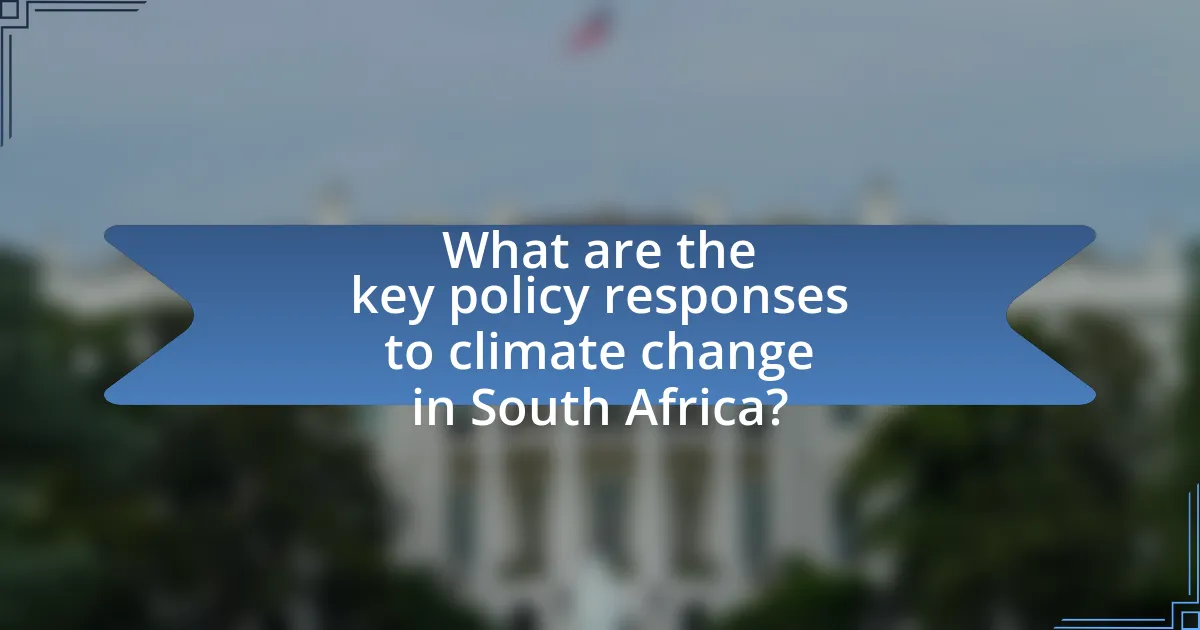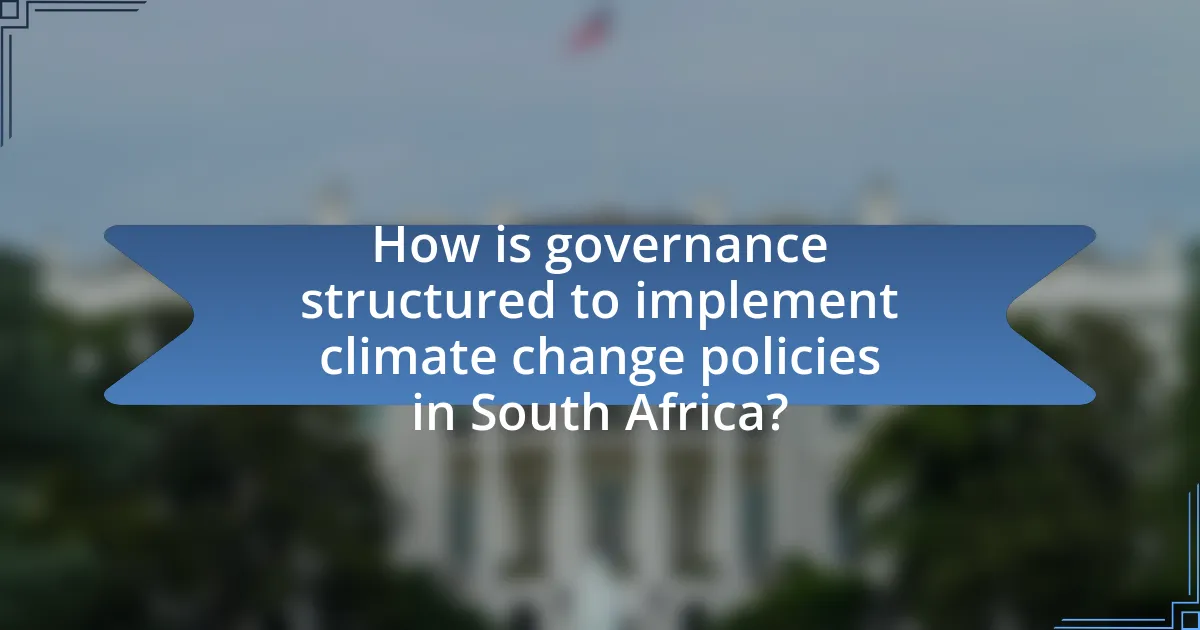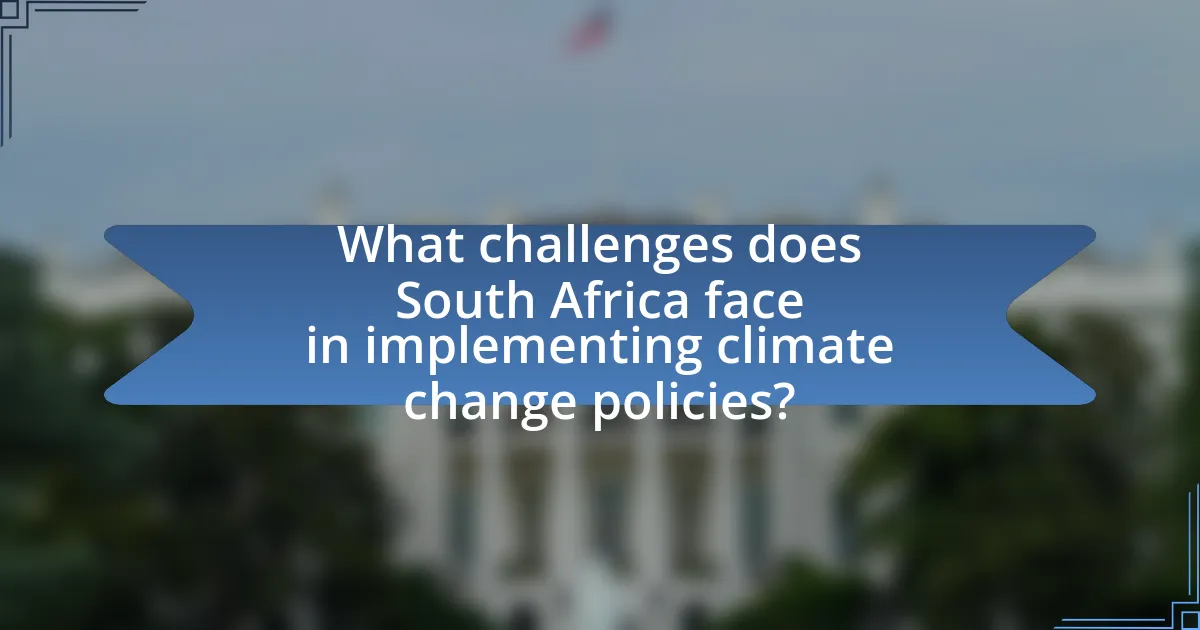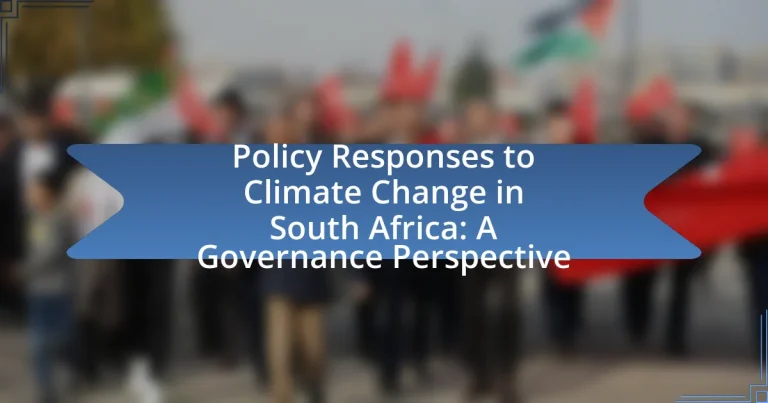The article focuses on the policy responses to climate change in South Africa, highlighting key strategies such as the National Climate Change Adaptation Strategy, the National Development Plan, and the Integrated Resource Plan. It examines how these policies align with international agreements like the Paris Agreement and the UN Sustainable Development Goals, emphasizing their impact on sectors such as energy, agriculture, and water resources. The governance structure for implementing these policies is analyzed, detailing the roles of national and local governments, public participation, and stakeholder engagement. Additionally, the article addresses the challenges faced in policy implementation, including economic constraints and reliance on fossil fuels, while proposing best practices for enhancing climate policy effectiveness.

What are the key policy responses to climate change in South Africa?
The key policy responses to climate change in South Africa include the National Climate Change Adaptation Strategy, the National Development Plan, and the Integrated Resource Plan. The National Climate Change Adaptation Strategy aims to enhance resilience to climate impacts across various sectors, while the National Development Plan outlines a long-term vision for sustainable development, integrating climate considerations into economic planning. The Integrated Resource Plan focuses on transitioning to renewable energy sources, targeting a significant reduction in greenhouse gas emissions by 2030. These policies are supported by the country’s commitments under the Paris Agreement, which aim to limit global warming and promote sustainable practices.
How do these policies align with international climate agreements?
The policies in South Africa align with international climate agreements by committing to greenhouse gas reduction targets consistent with the Paris Agreement. Specifically, South Africa’s Nationally Determined Contributions (NDCs) aim to reduce emissions by 34% by 2020 and 42% by 2025, reflecting the country’s commitment to global climate goals. This alignment is further supported by South Africa’s participation in the United Nations Framework Convention on Climate Change (UNFCCC) and its adherence to the principles of equity and common but differentiated responsibilities, which are foundational to international climate agreements.
What role does the Paris Agreement play in shaping South Africa’s climate policies?
The Paris Agreement significantly influences South Africa’s climate policies by establishing legally binding commitments to reduce greenhouse gas emissions. This international accord requires South Africa to set and achieve nationally determined contributions (NDCs), which are specific targets for emission reductions. As a result, South Africa has committed to reducing its emissions by 42% by 2025, aligning its national policies with the global goal of limiting temperature rise to well below 2 degrees Celsius. The agreement also encourages South Africa to enhance its climate resilience and adaptation strategies, thereby shaping its governance framework for climate action.
How does South Africa’s commitment to the UN Sustainable Development Goals influence its climate strategies?
South Africa’s commitment to the UN Sustainable Development Goals (SDGs) significantly influences its climate strategies by aligning national policies with global sustainability objectives. This alignment is evident in South Africa’s National Development Plan, which integrates SDGs into its climate action framework, emphasizing the need for sustainable economic growth, social equity, and environmental protection. For instance, the country aims to reduce greenhouse gas emissions in line with SDG 13 (Climate Action) while promoting renewable energy sources, which supports SDG 7 (Affordable and Clean Energy). Furthermore, South Africa’s participation in international climate agreements, such as the Paris Agreement, reflects its commitment to achieving these goals, thereby shaping its climate policies to foster resilience and adaptation in vulnerable communities.
What are the main sectors affected by climate change policies in South Africa?
The main sectors affected by climate change policies in South Africa include energy, agriculture, water resources, and transportation. The energy sector is impacted due to the transition towards renewable energy sources and the reduction of greenhouse gas emissions. Agriculture faces challenges related to changing weather patterns, which affect crop yields and food security. Water resources are influenced by policies aimed at managing water scarcity and ensuring sustainable usage amid climate variability. Lastly, transportation is affected as policies promote low-carbon transport solutions to reduce emissions. These sectors are critical as they directly relate to South Africa’s economic stability and environmental sustainability.
How do agricultural policies address climate resilience?
Agricultural policies address climate resilience by promoting sustainable farming practices, enhancing resource management, and supporting adaptive measures to mitigate climate impacts. These policies often include incentives for farmers to adopt conservation agriculture, which improves soil health and water retention, thereby increasing resilience to droughts and floods. For instance, South Africa’s National Climate Change Adaptation Strategy emphasizes the importance of integrating climate considerations into agricultural planning and practices, aiming to reduce vulnerability and enhance food security. Additionally, policies may provide financial support for research and development of climate-resilient crop varieties, which can withstand extreme weather conditions, further reinforcing the agricultural sector’s ability to adapt to climate change.
What measures are taken in the energy sector to combat climate change?
The energy sector implements several measures to combat climate change, including transitioning to renewable energy sources, enhancing energy efficiency, and promoting carbon capture technologies. In South Africa, the government has set ambitious targets to increase the share of renewable energy in the national energy mix, aiming for 17,800 MW of renewable energy capacity by 2030 as outlined in the Integrated Resource Plan. Additionally, energy efficiency programs are being promoted to reduce overall energy consumption, which can lead to lower greenhouse gas emissions. The implementation of carbon capture and storage technologies is also being explored to mitigate emissions from fossil fuel-based power generation. These measures are supported by policies such as the Renewable Energy Independent Power Producer Procurement Programme, which encourages private investment in renewable energy projects.

How is governance structured to implement climate change policies in South Africa?
Governance in South Africa for implementing climate change policies is structured through a multi-tiered framework involving national, provincial, and local government levels, alongside various stakeholders. The national government, primarily through the Department of Forestry, Fisheries and the Environment, leads the formulation of climate policies, such as the National Climate Change Adaptation Strategy. Provincial governments are responsible for implementing these policies within their jurisdictions, while local governments are tasked with integrating climate action into municipal planning and development. Additionally, South Africa engages in international agreements, such as the Paris Agreement, which influences domestic policy frameworks. This governance structure is supported by legislation like the National Environmental Management Act, which provides a legal basis for environmental governance and climate action.
What are the roles of national and local governments in climate governance?
National and local governments play crucial roles in climate governance by formulating and implementing policies that address climate change impacts. National governments establish overarching climate policies, set emission reduction targets, and create regulatory frameworks, such as South Africa’s National Climate Change Adaptation Strategy, which aims to enhance resilience to climate impacts. Local governments, on the other hand, are responsible for executing these policies at the community level, adapting them to local contexts, and engaging citizens in climate action initiatives. For instance, local municipalities in South Africa develop Integrated Development Plans that incorporate climate resilience measures, ensuring that local infrastructure and services are prepared for climate-related challenges. This multi-level governance approach is essential for effective climate action, as it aligns national objectives with local needs and capacities.
How do local municipalities contribute to climate action plans?
Local municipalities contribute to climate action plans by implementing localized strategies that address climate change impacts and promote sustainability. They develop and enforce regulations that reduce greenhouse gas emissions, such as energy efficiency standards and waste management policies. Additionally, municipalities engage in community education and outreach programs to raise awareness about climate issues and encourage public participation in sustainability initiatives. For instance, the South African Local Government Association emphasizes the role of municipalities in integrating climate considerations into urban planning and service delivery, which is crucial for achieving national climate goals.
What is the significance of intergovernmental relations in climate policy implementation?
Intergovernmental relations are crucial for effective climate policy implementation as they facilitate coordination and collaboration among various levels of government. In South Africa, where climate change impacts are significant, these relations ensure that national policies align with provincial and local initiatives, enabling a unified approach to climate action. For instance, the National Climate Change Adaptation Strategy emphasizes the need for integrated governance, highlighting that successful climate responses require cooperation between national, provincial, and municipal authorities. This collaborative framework allows for resource sharing, knowledge exchange, and the harmonization of efforts, ultimately leading to more effective and comprehensive climate policies.
How do public participation and stakeholder engagement influence climate policy?
Public participation and stakeholder engagement significantly influence climate policy by ensuring that diverse perspectives and local knowledge are integrated into decision-making processes. This inclusion enhances the legitimacy and effectiveness of climate policies, as evidenced by the South African government’s reliance on public consultations and stakeholder forums to shape its National Climate Change Adaptation Strategy. Research indicates that policies developed with active public involvement are more likely to gain public support and compliance, leading to better implementation outcomes. For instance, the South African National Development Plan emphasizes the importance of stakeholder engagement in achieving sustainable development goals, highlighting that inclusive processes can lead to more equitable and effective climate action.
What mechanisms exist for community involvement in climate decision-making?
Community involvement in climate decision-making in South Africa is facilitated through mechanisms such as public consultations, stakeholder forums, and participatory governance frameworks. Public consultations allow community members to voice their concerns and suggestions regarding climate policies, ensuring that local knowledge and priorities are considered. Stakeholder forums bring together various groups, including government, NGOs, and community representatives, to collaboratively discuss and develop climate strategies. Participatory governance frameworks, such as the Integrated Development Plans (IDPs), mandate local governments to engage communities in planning processes, thereby enhancing transparency and accountability in climate-related decisions. These mechanisms are essential for fostering inclusive dialogue and ensuring that climate policies reflect the needs and aspirations of local populations.
How do NGOs and civil society organizations impact climate governance?
NGOs and civil society organizations significantly influence climate governance by advocating for policy changes, raising public awareness, and holding governments accountable. These organizations often engage in research and provide data that inform climate policies, such as the South African Climate Change Response Policy, which emphasizes stakeholder participation. For instance, NGOs like the South African Climate Action Network mobilize communities and influence legislative processes, ensuring that marginalized voices are included in climate discussions. Their efforts contribute to more transparent and inclusive governance, ultimately leading to more effective climate action.

What challenges does South Africa face in implementing climate change policies?
South Africa faces significant challenges in implementing climate change policies, primarily due to economic constraints, social inequalities, and institutional weaknesses. The country relies heavily on coal for energy, which complicates the transition to renewable sources and increases greenhouse gas emissions. Additionally, high levels of poverty and unemployment hinder public support for climate initiatives, as immediate economic needs often take precedence over long-term environmental goals. Institutional weaknesses, such as fragmented governance and lack of coordination among various levels of government, further impede effective policy implementation. According to the South African National Development Plan, these factors collectively undermine the country’s ability to meet its climate commitments and adapt to the impacts of climate change.
How do economic factors affect the effectiveness of climate policies?
Economic factors significantly influence the effectiveness of climate policies by determining the availability of resources, public support, and the overall feasibility of implementation. For instance, countries with stronger economies can allocate more funding towards renewable energy projects and infrastructure improvements, enhancing the impact of climate initiatives. In South Africa, economic constraints have led to limited investment in green technologies, which hampers the country’s ability to meet its climate goals. Additionally, fluctuations in economic growth can affect public perception and political will, as seen during periods of economic downturn when climate policies may be deprioritized in favor of immediate economic recovery. Thus, the interplay between economic stability and climate policy effectiveness is crucial for achieving sustainable environmental outcomes.
What are the financial constraints in funding climate initiatives?
Financial constraints in funding climate initiatives include limited public budgets, high upfront costs, and insufficient private sector investment. Governments often face competing priorities that restrict the allocation of funds for climate projects, leading to inadequate financial resources. For instance, in South Africa, the National Treasury has reported that budgetary pressures limit the ability to finance large-scale climate initiatives effectively. Additionally, the high initial capital required for renewable energy projects can deter private investors, as evidenced by the International Renewable Energy Agency’s findings that highlight the need for innovative financing mechanisms to attract investment. Furthermore, the lack of clear policy frameworks and regulatory certainty can create an unfavorable environment for funding, as seen in various climate initiatives that struggle to secure necessary financial backing.
How does the reliance on fossil fuels complicate policy implementation?
The reliance on fossil fuels complicates policy implementation by creating vested interests that resist transitions to renewable energy sources. These vested interests often include powerful fossil fuel industries that lobby against regulatory changes, thereby hindering the adoption of climate policies. For instance, in South Africa, the energy sector is heavily dependent on coal, which accounts for approximately 80% of the country’s electricity generation. This dependency not only limits the government’s ability to implement effective climate policies but also creates economic and social challenges, as job losses in fossil fuel industries can lead to public opposition against policy changes.
What social and political barriers hinder effective climate governance?
Social and political barriers that hinder effective climate governance include lack of political will, inadequate public engagement, and entrenched interests. Political leaders often prioritize short-term economic gains over long-term environmental sustainability, which undermines climate policies. For instance, in South Africa, the reliance on fossil fuels for economic growth creates resistance to transitioning to renewable energy sources. Additionally, public engagement is often limited, resulting in a lack of awareness and support for climate initiatives. Research indicates that communities with low levels of participation in climate governance are less likely to adopt sustainable practices. Furthermore, powerful lobbying from industries that benefit from the status quo can obstruct meaningful climate action, as seen in the influence of coal and mining sectors in South Africa’s policy-making processes.
How does public perception of climate change influence policy acceptance?
Public perception of climate change significantly influences policy acceptance by shaping the priorities and urgency of governmental action. When the public views climate change as a critical issue, policymakers are more likely to propose and implement robust climate policies, as seen in South Africa where heightened awareness has led to increased support for renewable energy initiatives. Research indicates that in regions where public concern is high, such as in urban areas of South Africa, there is a greater likelihood of endorsing policies aimed at reducing carbon emissions, as evidenced by the 2019 South African Climate Change Adaptation Strategy, which was developed in response to public demand for action. Thus, the alignment of public perception with climate science directly correlates with the acceptance and effectiveness of climate policies.
What role does political stability play in advancing climate initiatives?
Political stability is crucial for advancing climate initiatives as it fosters a conducive environment for long-term planning and investment in sustainable practices. Stable governments can implement consistent policies, allocate resources effectively, and engage stakeholders in meaningful dialogue, which is essential for the success of climate initiatives. For instance, countries with political stability, such as those in Scandinavia, have successfully implemented comprehensive climate policies that have led to significant reductions in greenhouse gas emissions. In contrast, nations experiencing political turmoil often face disruptions in policy continuity, leading to stalled or ineffective climate action. This correlation highlights that political stability directly influences the capacity to develop and sustain effective climate strategies.
What best practices can enhance climate policy effectiveness in South Africa?
Best practices that can enhance climate policy effectiveness in South Africa include integrating stakeholder engagement, implementing evidence-based decision-making, and fostering intergovernmental collaboration. Engaging diverse stakeholders, such as local communities, businesses, and NGOs, ensures that policies reflect the needs and knowledge of those affected, leading to more robust and accepted solutions. Evidence-based decision-making, supported by data and research, allows for informed policy choices that can adapt to changing climate conditions and socio-economic contexts. Furthermore, intergovernmental collaboration among national, provincial, and local governments promotes coherence and alignment in climate strategies, which is crucial for addressing the multifaceted nature of climate change. These practices are supported by the South African National Climate Change Adaptation Strategy, which emphasizes the importance of inclusive governance and data-driven approaches in enhancing policy effectiveness.
How can collaboration between government and private sectors improve outcomes?
Collaboration between government and private sectors can improve outcomes by leveraging resources, expertise, and innovation to address complex challenges such as climate change. For instance, public-private partnerships can facilitate the development of sustainable technologies and infrastructure, leading to more effective policy implementation. A study by the World Economic Forum highlights that such collaborations can enhance resource efficiency and accelerate the transition to a low-carbon economy, ultimately resulting in better environmental and economic outcomes.
What lessons can be learned from successful climate initiatives in other countries?
Successful climate initiatives in other countries demonstrate the importance of strong governmental commitment and multi-stakeholder engagement. For instance, Denmark’s transition to renewable energy, which includes wind power contributing to over 40% of its electricity, showcases how policy frameworks can effectively promote sustainable practices. Additionally, Germany’s Energiewende policy emphasizes the role of public participation and investment in green technologies, leading to significant reductions in greenhouse gas emissions. These examples illustrate that comprehensive policies, public involvement, and investment in renewable resources are critical for achieving climate goals.


